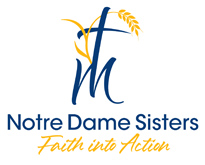Reflection for the 30th Sunday in Ordinary Time, October 27, 2024
by Michael Driscoll, Notre Dame Associate
In today’s readings, we are drawn into the mystery of God’s unrelenting mercy—a mercy that is not distant, but intimately aware of our needs and brokenness. At the heart of this mercy is a God who sees us, who hears our cries, and who acts to restore us to wholeness. This is a powerful theme that unites the readings, from the prophetic promises in Jeremiah to the healing of Bartimaeus in the Gospel of Mark.
In the first reading, from *Jeremiah 31:7-9*, we encounter a vision of hope. The people of Israel, once scattered and broken by exile, are being called home by God. This is not merely a political or physical return; it is a profound spiritual restoration. God says, “I will gather them from the ends of the earth,” including the blind and the lame, those who are most vulnerable and marginalized. The image of God leading them by brooks of water, on a level path where they will not stumble, is one of deep tenderness. It reminds us that God is not indifferent to our pain. God sees our struggles, our blindness, and offers us a path toward healing.
This promise of restoration finds a joyful echo in *Psalm 126*. The psalmist sings of the Lord’s great act of deliverance, and it is as if the people are in a dream. They have been restored, and their mouths are filled with laughter, their tongues with shouts of joy. But this joy is not born from a life free of hardship. It is a joy that comes from having sown in tears, from having lived through exile and despair. It is a joy that knows what it means to wait, to yearn for salvation. In our own lives, this psalm invites us to consider the seeds of sorrow we may still be sowing—seeds that, in God’s time, will one day yield a harvest of joy.
The reading from *Hebrews 5:1-6* brings us deeper into the mystery of God’s solidarity with our human condition. Christ, as the high priest, does not stand apart from us. He is not a distant mediator but one who shares in our weakness. He understands our suffering because he has lived it. And it is through this shared experience of human fragility that Christ becomes our perfect intercessor before God. This image of Christ as the compassionate high priest challenges us to think of our relationship with God not in terms of fear or distance, but in terms of intimacy and trust. We can bring our brokenness to Christ, confident that he understands and that he will carry our burdens before the Father.
Finally, in *Mark 10:46-52*, we encounter Bartimaeus, the blind beggar, sitting by the roadside. This is perhaps one of the most powerful moments in the Gospel. Bartimaeus, blind and marginalized, cries out with all his might: “Jesus, Son of David, have mercy on me!” Despite being rebuked by the crowd, he refuses to be silenced. He cries out again, louder, until Jesus stops and calls for him. Jesus asks Bartimaeus a question that resonates deeply: “What do you want me to do for you?” Bartimaeus replies, “Master, I want to see.” And with that, Jesus restores his sight, declaring, “Your faith has saved you.”
There is something profoundly moving in Bartimaeus’ boldness. He does not let the crowd’s disapproval silence him; he cries out for what he needs with unwavering faith. How often do we find ourselves in Bartimaeus’ position? Blind to God’s presence in our lives, sitting on the margins, unsure if we are even worthy to ask for healing. Yet Bartimaeus teaches us something crucial: faith is not about having all the answers or being certain of the outcome. Faith is about trusting that God hears our cries and responds with mercy. It is about daring to believe that we, too, can be healed.
As we reflect on these readings, we are invited to consider our own blindness—those places in our lives where we are unable to see clearly, where we sit in darkness by the roadside, waiting for Christ to pass by. Are we willing to cry out for mercy, even when the world tells us to be silent? Are we willing to trust that God sees us, hears us, and desires our healing?
At the end of today’s Gospel, we are told that once Bartimaeus received his sight, he “followed Jesus on the way.” This is not just physical sight that Bartimaeus gains; it is spiritual vision. He does not return to his former life; he becomes a disciple, walking the path of faith. His healing leads him to follow Jesus more closely, to live in the light of God’s grace.
And so, as we ponder these scriptures, I leave you with these questions for reflection:
- In what ways are we still in exile, longing to return to the fullness of God’s presence
- Where are we sowing seeds in tears, trusting that God will bring a harvest of joy?
- How do we understand Christ as our high priest—one who shares in our weakness and intercedes for us in love?
- Where in our lives do we experience spiritual blindness? Are we willing, like Bartimaeus, to cry out for mercy and healing?
- When Christ asks us, “What do you want me to do for you?” how do we respond? What is the deepest need of our heart that we bring before him?
May we, like Bartimaeus, find the courage to cry out, “Jesus, Son of David, have mercy on me,” and in our faith, may we find the healing and sight that leads us to follow Jesus on the way.
What Good Is It Anyway?
